Champlain Orchards
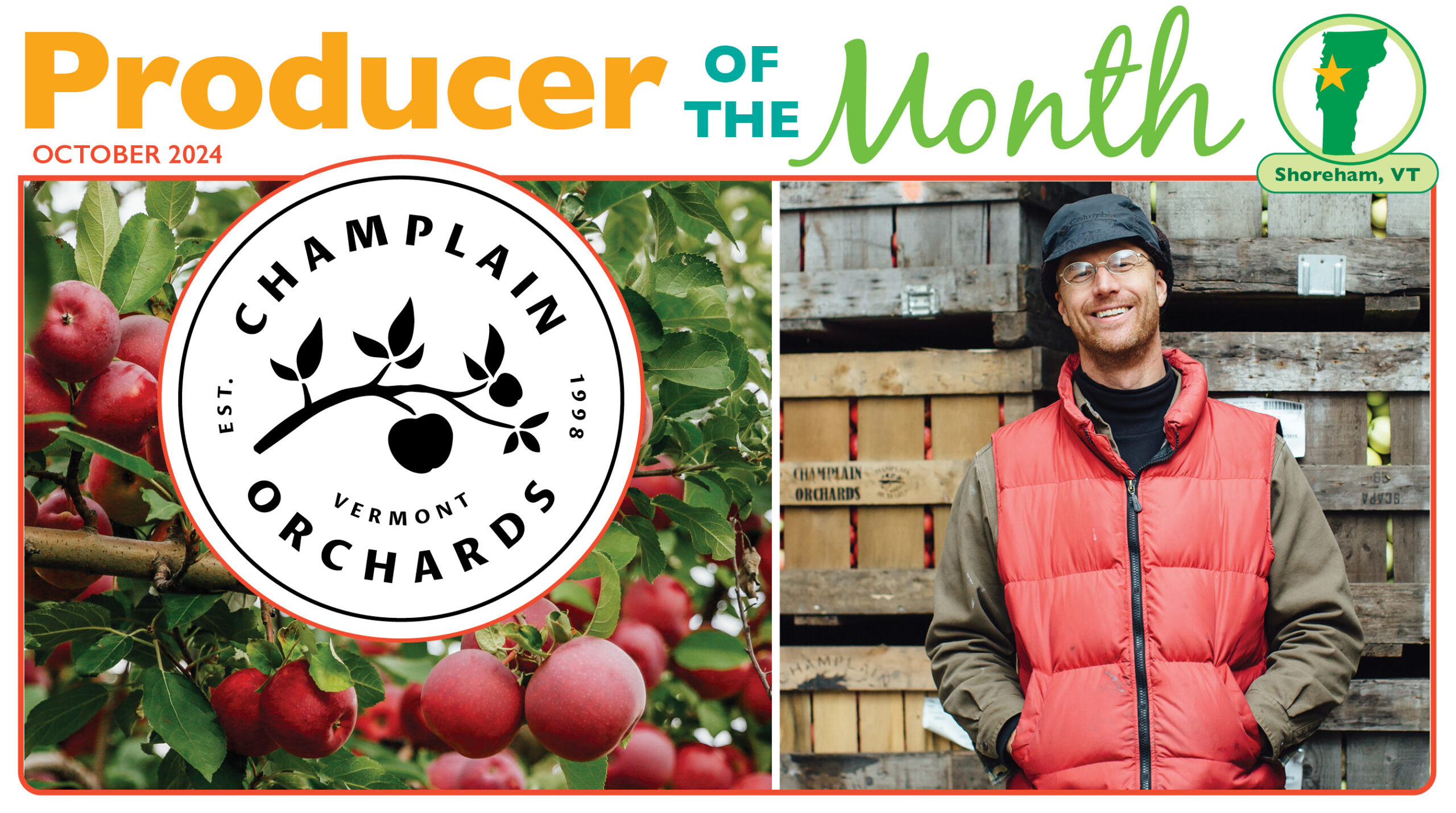
Bill Suhr purchased sixty acres of land in Shoreham, VT, at the young age of twenty-seven. He’d been coming to Vermont during summers his whole life to visit his grandmother, who attended the University of Vermont (UVM) and had a home in Greensboro. He grew up in a tiny town outside of Baltimore, MD, and as a young man decided to attend his grandmother’s alma mater. He initially went to UVM with the intention of majoring in business, but it didn’t take long for him to find the places where he felt happiest: the School of Natural Resources and the Outing Club. He loved being outdoors, and ended up with a Bachelor of Science in Forest Biology instead.
Bill’s ability and willingness to think in terms of economic strategy, though, is still apparent when discussing the Champlain Orchards operation. His wife and business partner, Andrea Scott, is the other leader at Champlain, and she ensures the orchard stays focused on ethical farming practices. Bill and Andrea constantly restrengthen the orchard’s commitment to the importance of their work as a part of a healthy, sustainable local food system. Together, they have grown Champlain Orchards tremendously. They now manage three hundred and fifty acres of ecologically certified orchards filled with heirloom apple trees, peach trees, plum trees, and other fruits. They make pies, hard cider, fresh cider, and cider donuts, and they operate a farm stand and cafe.
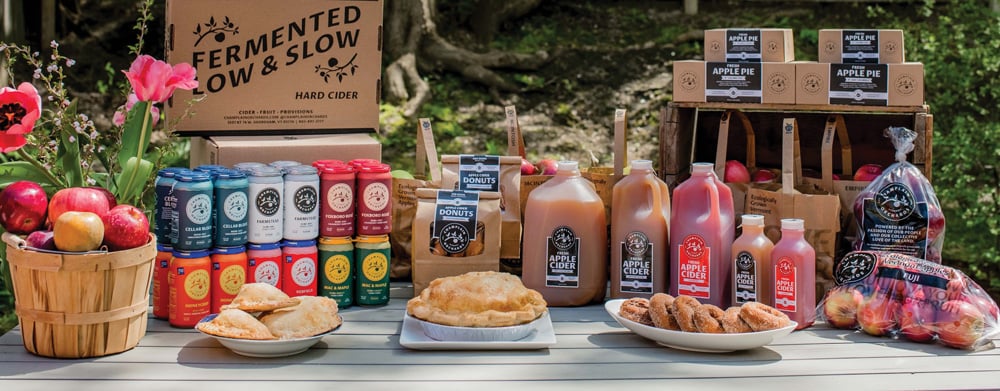
Opportunities and Gifts
This vocation comes with many wonderful gifts and many challenges.
The surroundings are stunning, with beautiful rolling hills of changing colors, rows of fruit trees, and New England-style barns. Bill and Andrea’s children, Rosa (age 10) and Rupert (age 13), are integral to the farm as well. Rosa spends her time assisting her mom, and Rupert is a great help to Bill. He has a particular affinity for harvesting, which is a great counterbalance to Bill’s love for the other end of the process—working in the fruit tree nursery (Champlain is unusual in its taking trees from the nursery to the field). Father and son in the forest and the fields: it’s a deeply meaningful part of the life Bill leads. It’s a life spent outdoors, with plants and family in nature.
The challenges are numerous and constant, and speak to the difficulty of doing this work with a commitment to doing it well, as opposed to cheaply. Agriculture is tough, and especially so with fruit trees. Apples and other tree fruits are less flexible than other crops in some ways: they are harvested just once a year, making environmental or other disruptions that much more impactful, and it takes years to grow a tree to the stage where it yields fruit. Talking to Bill, one gets the granular view of their efforts to get through the puzzles and predicaments of each season.
Ecological Efforts
Each element of the operation is examined for opportunities to reduce their impact on the environment and increase sustainability. It’s clearly a lot of work, but it’s also wonderful to hear someone calmly break down the overwhelming specter of climate change into small, actionable steps in everyday life. So much has been done already, or is in process. All three hundred and fifty acres are owned by the Vermont Land Trust, which ensures the properties will never be developed or used for anything other than agriculture. Three large solar panel installations help supply 60% of the orchard’s electrical needs. And they’re in the long and cost-intensive process of creating trellised, high-density orchards, which are more environmentally sustainable in the long term.
The refrigerated truck they use for deliveries runs on diesel, so Bill has his eye on the new electric refrigerated truck currently being produced in Europe. The first-to-market iterations of products such as these are vulnerable to issues, so they’re biding their time to see how it fares. Their tractors also run on diesel, and they hope to have an electric replacement at some point.
They’ve also run through the pros and cons of using glass bottles for sweet cider instead of plastic, but because of the energy usage it would take to clean the bottles it doesn’t make sense. The cardboard boxes used for deliveries are Sustainable Forestry Initiative certified and printed with encouragement to return the boxes via the delivery person back to the orchard for reuse.
But the greatest commitment they’ve made is to follow the EcoCertified program, which you may be familiar with.1 EcoCertified is our region’s answer to what organic apple certification really should be: instead of a one-size-fits-all approach that’s based on the climate of Washington and Oregon (the seat of power when it comes to the US apple industry), it’s an integrated pest management system that takes into account our much wetter and thus pest-exacerbating weather, the long-term quality of the soil, and the health of the entire ecosystem of the orchard overall, including other plants, birds, and friendly bugs.
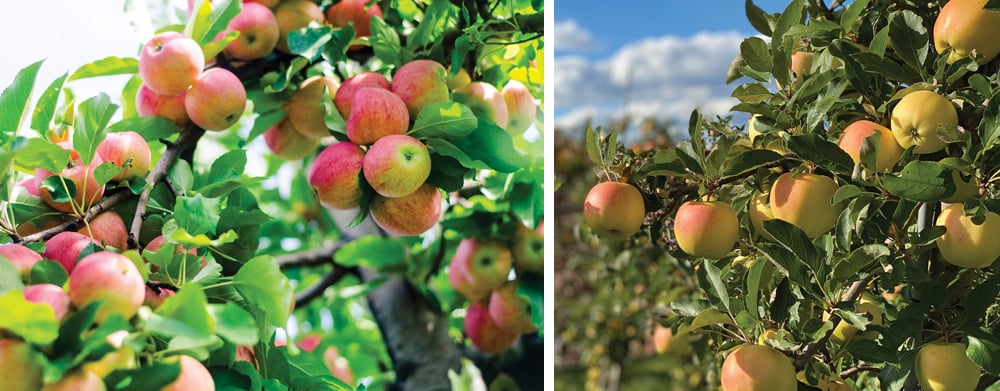
All of these things are resource-intensive. A lot of thought, time, and money is spent on bettering the orchard’s relationship to the environment. It’s only because of Bill and Andrea’s commitment to what they know is the best way to farm in the right relationship with the land they occupy that these efforts are taken year by year, month by month, and day by day, to make the orchard operate with a smaller carbon footprint, all while bringing in enough revenue to keep the operation rolling along into the future.
Educated Consumers
Again and again, Bill emphasized the importance of connecting to consumers like you. He pointed out what a special place we have here in Vermont, with our strong network of food co-ops and our population of informed customers. He views the relationships that are formed between producers and consumers through the efforts of local food purveyors like our Co-op as hugely valuable. For instance, this article you’re reading now is a somewhat resource-intensive endeavor that our Co-op invests in because we believe in the importance of supporting our regional food system; we want people to know what goes on behind the scenes, the extent that local and regional growers and makers go to in order to make healthy, safe, high-quality foods. These articles and other avenues of education that we and many other food co-ops invest in strengthen our food system by helping people make informed choices about the food they choose to buy. Bill Suhr does not take this for granted. Nor does he take for granted that we live in a region where many people have a baseline knowledge of our food system that drives them to buy locally grown, where in other parts of the country this is not as true. He cherishes the fact that we co-ops and shoppers care. And he is keenly aware that there is a gap between producers and consumers that needs to be bridged in order to get the full breadth of Champlain’s mission across. This is where food co-ops, local food media outlets, educators, and others can come in to help. Shoppers’ choices have an enormous impact on independent orchards, farms, and other businesses. It’s vital that the difference they make in our food system is clear.
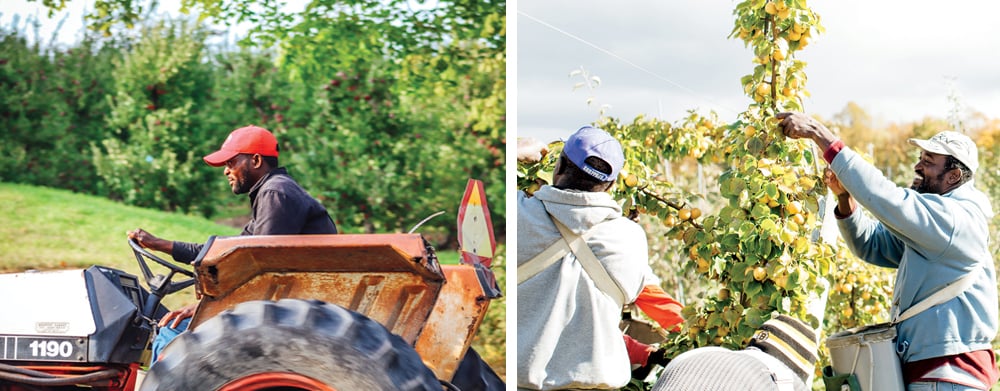
Along these lines, Bill also feels it’s important that consumers know the hands that grow their food. In addition to thirty full-time local staff members, Champlain employs twenty-three men from Jamaica for ten months each year; for two months of the main fall harvest an additional forty arrive to help with harvest. They are here in Vermont as part of the H-2A visa program, which is a temporary agricultural worker program. There’s a lot of complex history behind the H-2A program—too much to do justice to here. At Champlain, the cohort of Jamaican immigrants are treated with respect and fair pay; there’s a great deal of appreciation for the skill and expertise they bring to the job, and a genuine desire to provide a good quality of life for them. For those who are interested in reading more about the background of this program, and perspectives on how it works today, we’ve included links to a couple of articles at the end of this feature.2
Year-Round Local
In a surprising twist, Bill said one of their challenges is to get people to not eat seasonally during certain times of the year. Instead of buying the organic California grapefruit this winter, buy the local Vermont apple!
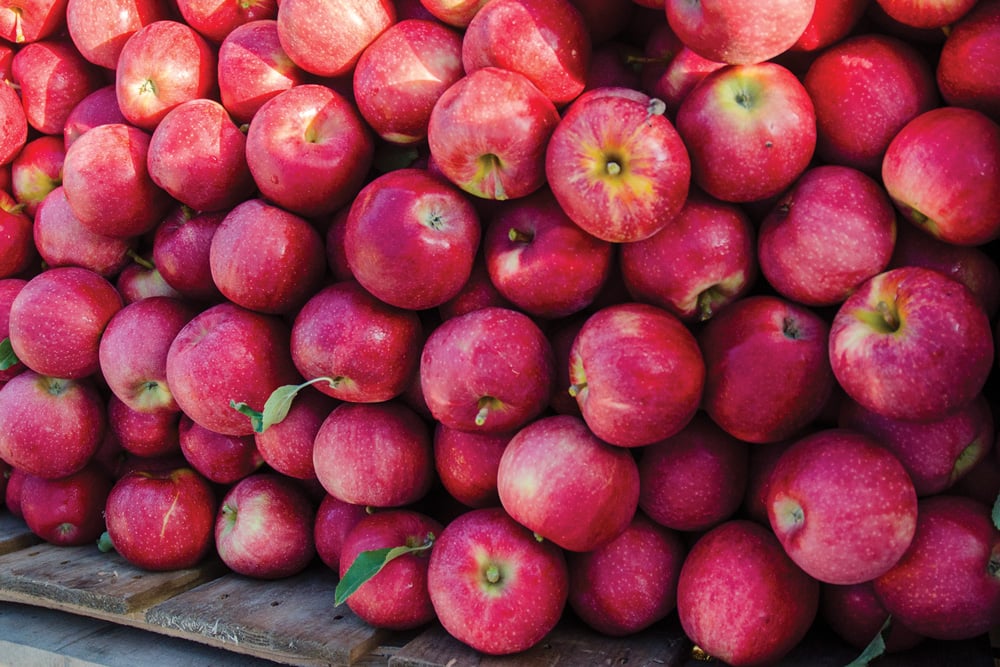
A large percentage of the power that Champlain uses goes into keeping their apples fresh all winter and spring. According to Bill, apples breathe: they take in oxygen and put out carbon dioxide just like we humans. To keep the apples fresh, at the orchard they control the makeup of the atmosphere in the refrigerated storage. They reduce the oxygen to 2.5%, and replace the 21% of oxygen that’s been removed with nitrogen. The apples go into a suspended state—time stops during their weeks in the special air. And when they’re brought out of this specialized storage in February, they’re just as crisp and sweet as when they were packed away in October.
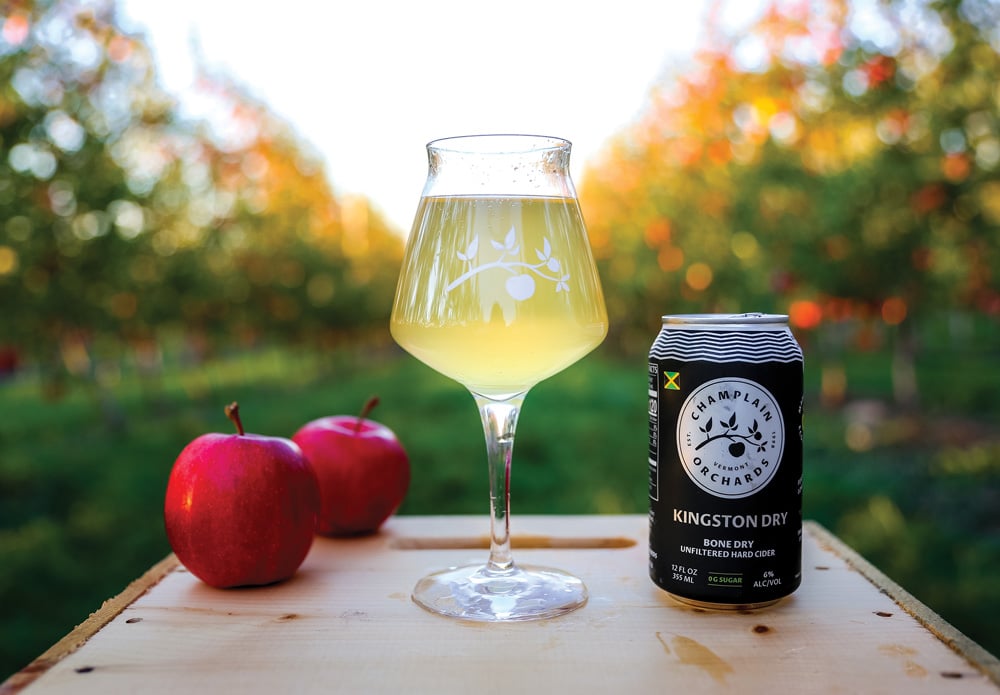
Bill admires farmers who have made a good go of it for a long time. He cited Jake Guest who founded Killdeer Farm as an example: he ran a successful business from a small farm stand, where, in addition to his own goods, he sold produce and products from other local businesses, thus supporting them along the way. And he retired thoughtfully, transitioning the farm to new farmers. This is the goal: not wild profit, not a fancy lifestyle or an astronomical salary, but a sustained level of good, healthy business that does right by the people and the land that are a part of it, even after this generation is gone. We encourage you to buy Champlain Orchards’ products and produce, and to buy from all our local and regional growers and makers. Your choices really do matter.
By Ruth Garbus
About Producer of The Month

Shop Online

On Sale Now!

